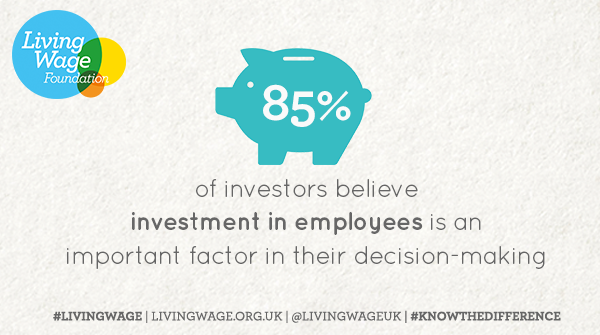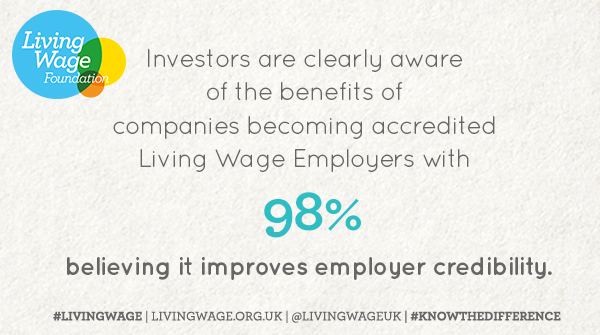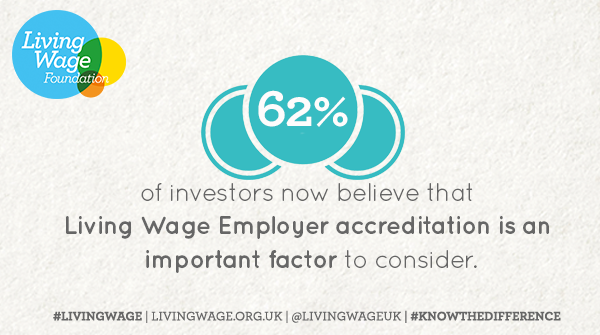Research by the University of Southampton Business School has found that 85% of investors believe investment in employees is an important factor in their decision-making.
85%-investors.png

The research, carried out in partnership with Aviva Investors, the Living Wage Foundation and the Economic & Social Research Council, explored investor perception of the Living Wage as a part of the environmental, social and governance (ESG) agenda of responsible investment, through surveys, interviews and stakeholder workshops.
The issue is one of particular importance to Aviva Investors who, with their £330bn worth of managed assets, have stated:
"We take the view that low wages are a material risk that can have a negative impact on a business's ability to deliver shareholder value and a source of significant disruption and reputation erosion. We have seen disputes over low wages result in production, revenue and share price decreases at companies in the mining and retail sectors." -Aviva Investors
The research shows that investors are clearly aware of the benefits of companies becoming accredited Living Wage Employers, with 98% believing it improves employer credibility, 94% acknowledging the societal benefits of higher wages, and 91% viewing it as a positive for staff morale and satisfaction. There were similar rates of awareness for the positive impacts on reputation, recruitment and retention.
98%-credibility.png

From the investment decision-making perspective referred to above, nearly two-thirds of investors now believe that Living Wage Employer accreditation is an important factor to consider.
"[W]e recognise the momentum and the attractions of [accreditation], and we would promote this as a valid area of consideration for all of our members to consider." - Surveyed investor
62%-accreditation-factor.png

Nearly a half of all investors surveyed prioritised the Living Wage when engaging with companies, also collaborating with industry, NGO and academic partners to promote the agenda. A quarter also incorporated the topic into their voting policies. Crucially, however, there was found to be more to do in this area, particularly considering the evidence that active ESG funds outperform their passive alternatives.
When it comes to engaging with companies on their Living Wage compliance, around a third of investors did so through collective agreement with others in the investment community, or through direct discussion with top management.
Many interviewees believed that the Living Wage as an ESG factor is likely to become more significant in the future, particularly given the increasing representation of Millennials and Generation Y in the workforce; groups which often prioritise values above profit.
From these findings come a number of recommendations for increasing awareness of the ESG importance and business benefits of Living Wage Employer accreditation. These include:
- Publishing of investment guidelines on Living Wage compliance
- Incorporation of the issue into voting policies
- Clearer alignment of the Living Wage with the UN Sustainable Development Goals
Investors possess a considerable amount of power when it comes to encouraging employers to act responsibly and ethically, in the interest of not only their staff and clients, but the long-term success of their business too. While Living Wage Employer accreditation has shown time and time again to generate numerous positive outcomes for businesses, we would also ask investors to do all they can to ensure as many people as possible can earn a fair day's pay for a hard day's work for their investment decisions.
Become a Living Wage Employer today.
